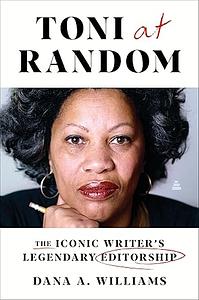Take a photo of a barcode or cover
💭 "Morrison appreciated any stylistic or aesthetic approach that made readers feel they were being let in on a secret."
A celebrity tell-all, a cookbook, a short story collection, a history of trains, a textual documentary of Black life, novels, an autobiography of a movement ... Morrison committed fully to 47 projects in twelve years. Williams reveals what Morrison called the "hard, important work that no one really talks about"—securing competitive contracts, crossing out, wrangling copy edits and wayward authors, completing acronyms, teasing apart sections, distinguishing voice, questioning characters ...
Books by Black authors are mostly Williams' focus—Muhammad Ali and June Jordan, Lucille Clifton and Angela Davis, Gayl Jones and Toni Cade Bambara, Huey P. Newton and Leon Forrest—though we also learn about folks like Melville Herskovits' (Cultural Relativism) and Boris Bittker's (Case for Black Reparations). Knowing that a role like hers was a time-sensitive response to cultural pressures, Morrison was determined to leave a record: Books that sold well and elevated Black voices.
We see over and over that beyond identifying narrative arc or summative description, beyond rearranging sections or clarifying prose ... Morrison actively promoted the books she edited: Speaking about them at events where she appeared as an author. Aggressively seeking radio spots and interviews and introductory essays and blurbs and critiques. Jockeying for space at relevant events to lob titles at potential readers. Morrison's confidence shines, too. She often treated critiques and sidesteps as insolence and even a lack of trust in her judgment or skills, leading to disappointment in the other person.
I still have so many questions! What spats and successes and shenanigans did she observe at Random? To what extent was Morrison more or less heavy-handed than peers? Accurate in predicting modest runs or great wins? How did she experience Silberman as a boss? What did people actually say in Williams' interviews?
There are several spots where transitions felt lacking; we abruptly jump to another book, another author and I'm not sure why there's no space between paragraphs or header or sentence to mark the shift (or why these items are in the same chapter).
Overall, as with just about everything Toni, I'm giddy with gratitude to contextualize a genius ✨️
This was so interesting and is great reading for publishing nerds like me. The research offers incredible detail into Morrison’s editorship and the role she played and impact she had on black American writing. I loved seeing her editorial work at a structural and line level as well as her involvement in design and marketing. The ways she fought for and championed her authors but also chastised them is delightful. She did not tolerate nonsense. The book showed a surprising amount of miscommunication between Morrison and some of her authors. Some of her sarcastic letters are glorious. I loved seeing the way she navigated the many institutions that stood in her way. That she did all this with two young children at home and while writing her first three novels is mind blowing. This is the portrait of a true old school publisher and I loved it though I imagine the level of detail will be too much for a general audience. Also, no acquisitions meetings!
hopeful
informative
inspiring
reflective
medium-paced
informative
inspiring
reflective
informative
medium-paced
Dana A. Williams does a remarkable job introducing us to Toni, the editor, and offering a compelling glimpse into her editorial vision and the behind-the-scenes decisions that shaped some of the most influential books in American literature. I especially loved reading about Toni’s strategic and deeply intentional support of Black women writers, many of whom I’ve long admired. Her commitment to ensuring Black authors were fairly compensated and given equal, if not greater, marketing attention than their white peers was powerful and affirming.
This memoir reminded me of another favorite I read this year, a historical fiction novel that reimagines the life of Jessie Redmon Fauset, one of the true godmothers of the Harlem Renaissance.
Pick this one up if you’re curious about the publishing world, the editorial process, and the fierce advocacy it takes to shape a literary legacy.
Huge thanks to NetGalley and Amistad for the opportunity to listen to this insightful and inspiring audiobook memoir of one of my all-time favorite writers.
informative
inspiring
medium-paced
informative
inspiring
reflective
medium-paced
informative
slow-paced
Was hoping for something with a bit more of a narrative, but really it was a series of case studies, essentially, of each book Toni Morrison edited. Given this, I couldn't really retain information and felt like I was learning more about each author and their work than Morrison as an editor, though I did get a good sense of that. I got bored now and again. I enjoyed when bits of correspondence was shared, especially when there was a lil' drama.
informative
slow-paced
I enjoyed the chance to get to know Toni Morrison as an editor in this book. The format is a little rinse and repeat, instead of giving a narrative we get examples of the Morrison's process with a handful of her authors/books. There was never really a reflection point for what TM meant as an editor to the industry at large. There are some really good chapters where there is drama or unique insight. Williams does not paint TM with only a rosey brush, she shows some darker shades which I really appreciated. There is a full picture of her at work. Overall the book was a little redundant (it read as an academic text in ways with the repeated points made) but also interesting.






